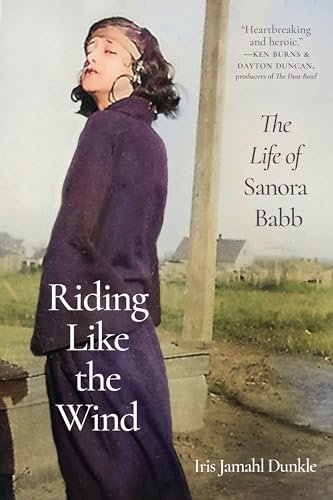
20 Jul Book Review of Riding Like the Wind: The Life of Sanora Babb
Riding Like the Wind: The Life of Sanora Babb – A Journey Worth Taking
When I first stumbled upon Riding Like the Wind: The Life of Sanora Babb by Hannah Dunkle, I was immediately captivated by the notion of exploring the life of such a remarkable figure. The weight of the book, combined with its impressive thousand-page length, may intimidate some, but trust me: this is a literary journey well worth embarking on. Babb’s story, steeped in grit and resilience, draws you in and pulls you through the vivid tapestry of American history and personal struggle.
Sanora Babb’s life is a narrative that weaves together themes of ingenuity, perseverance, and the relentless pursuit of writing against the backdrop of the Great Depression and the Dust Bowl. Dunkle’s depiction of Babb’s childhood in a dugout, her encounters with Native peoples, and the harrowing realities of poverty is both enlightening and heartbreaking. One moment that stood out to me was when Babb learned arithmetic and letters in unconventional ways, a testament to the resourcefulness required of her and, indeed, those of her generation. It’s a reminder that education is not merely confined to formal walls; it can thrive in the most unlikeliest of circumstances.
As I ventured further into Babb’s story, her travels and tribulations painted a vivid picture of an early 20th-century America brimming with change—an America that was chaotic yet teeming with potential. Her solo trek from Chicago to Los Angeles, fueled by sheer determination, resonated deeply with me. I couldn’t help but appreciate her courage, especially when she accepted an unexpected job in Salt Lake City when her money ran out. Moments like these illustrate not only the physical but the emotional landscape of survival.
Dunkle’s writing style is both lyrical and accessible, making complex historical themes digestible while maintaining the narrative’s richness. The book’s pacing ebbs and flows, mirroring the unpredictability of Babb’s life. I found myself particularly drawn to the personal anecdotes that Dunkle chose to highlight, like Babb’s mother casting away her wedding ring—an act that spoke volumes about the constraints placed upon women of that era. Such moments breathe life into the text, making it not just an account of facts but a profound exploration of human experiences.
There are many powerful insights within the pages of Riding Like the Wind, but one that lingered with me was a quote attributed to Carlos Bulosan: "Neither of you has had to learn to be without prejudice: you simply have none." This statement encapsulates the inherent empathy and kindness Babb possessed, a rare trait that resonates in today’s polarized society.
In the final segments, as Babb navigates the challenges of being an unpublished writer—an experience familiar to many—Dunkle exposes the often harsh realities faced by women in literature, particularly those without familial connections or backing. It’s a narrative of unrecognized brilliance, flanked by the shadows of those who took credit for her raw talent.
Riding Like the Wind is more than just an exploration of a woman’s life; it’s a treasure trove of American history, rife with lessons on perseverance, identity, and social justice. I would recommend this book not just to history buffs, but to anyone who appreciates a good underdog story. It will appeal to writers, particularly women, who find resonance in Babb’s struggles and triumphs.
This book left me with an enriched understanding of the untold stories that frame our shared history. It’s an invitation to explore not just Babb’s life, but the deep, rich soil of history—a reminder of the stories waiting to be unearthed if only we dig a little deeper.
Discover more about Riding Like the Wind: The Life of Sanora Babb on GoodReads >>









